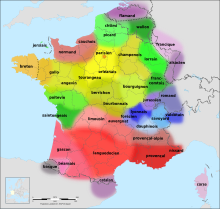Vergonha

La vergonha (Occitan pronunciation: [berɣuɲɔ, veʀɡuɲɔ], German: "Shame") call the Occitans the impact of various measures taken by the French policy on citizens whose mother tongue is a language other than French is. Especially from the 16th century onwards, Occitan native speakers in connection with Art. 111 of the Edict of Villers-Cotterêts were led to reject their own mother tongue (or that of their parents) through official exclusion, humiliation in school and rejection by the media to be ashamed of them. Vergonha, which is still a taboo subject in France , is viewed by some scholars as the result of an attempted linguicide . In 1860, before compulsory schooling was introduced , Occitan native speakers represented more than 39% and the French-speaking population was 52%. Their share fell to 26–36% in the 1920s and then fell to less than 7% in 1993.
19th century
In the 1880s, Jules Ferry implemented a series of tough measures to further weaken the regional languages in France, as shown in a 1998 report by Bernard Poignant to Lionel Jospin . This included the fact that children were punished by their teachers if they spoke a language other than standard French, such as Occitan or Breton, in school. In the event of a violation, various measures such as the so-called " le symbole " were threatened , in which children and young people were hung a block around their necks as punishment.
Mid 20th century to the present
In 1972, Georges Pompidou, the then French President , declared that there was no room for regional languages in a France whose fate was to put its seal on Europe. In an election speech in Lorient on March 14, 1981, François Mitterrand claimed :
“The time has come to give the languages and cultures of France official status. It is time to open the school doors for them, to create regional radio and television stations so that they can be broadcast, so that they can play the role they deserve in public life. "
However, these declarations were hardly followed by effective action: the regional languages are present to varying degrees in schools and media, but none of them have official status. Most recently, on October 27, 2015 , the French Senate rejected a bill to ratify the European Charter for Regional or Minority Languages , which would have given regional languages such as Occitan an official status in conjunction with a constitutional reform.
Individual evidence
- ^ Aurélie Joubert: A Comparative Study of the Evolution of Prestige Formations and of Speakers' Attitudes in Occitan and Catalan . 2010.
- ↑ a b Llengua Nacional, Catalan linguistic review ( Memento of the original of July 16, 2011 in the Internet Archive ) Info: The archive link was automatically inserted and not yet checked. Please check the original and archive link according to the instructions and then remove this notice. , Text available at http://fpl.forumactif.com/Forum-Occitan-f11/Le-patois-des-vieux-el-patues-dels-vells-p11914.htm
- ↑ Louis de Baecker, Grammaire comparée des langues de la France , 1860, p. 52: parlée dans le Midi de la France par quatorze millions d'habitants ("spoken in southern France by fourteen million inhabitants"). [1] + [2]
- ^ Yann Gaussen, Du fédéralisme de Proudhon au Félibrige de Mistral , 1927, p. 4: [...] défendre une langue, qui est aujourd'hui la mère de la nôtre, parlée encore par plus de dix millions d'individus [...] ("protects a language that is still used by more than ten Is spoken to millions of people "). [3]
- ↑ Stephen Barbour & Cathie Carmichael, Language and nationalism in Europe , 2000, p. 62
- ↑ LANGUES ET CULTURES REGIONALES - Rapport de Monsieur Bernard Poignant - Maire de Quimper A Monsieur Lionel Jospin - Premier Ministre Le 1er juillet 1998, chez.com
- ^ Nicolas de la Casinière: Ecoles Diwan, la bosse du breton ( fr ) October 1, 1998. Archived from the original on October 14, 1999. Retrieved on June 28, 2008.
- ↑ Consequences sociales, politiques économiques et de la discrimination linguistique. Audition au Parlement européen, groupe ALDE. La République française: non-droit au nom de l'égalité pour les locuteurs des langues régionales ou minoritaires Tangi Louarn, président d'EBLUL-France ( page no longer available , search in web archives ) Info: The link was automatically marked as defective. Please check the link according to the instructions and then remove this notice.
- ↑ Le temps est venu d'un statut des langues et cultures de France, at pactedeslangues.com ( Memento of the original of September 8, 2009 in the Internet Archive ) Info: The archive link has been inserted automatically and has not yet been checked. Please check the original and archive link according to the instructions and then remove this notice.
- ↑ Le Sénat dit non à la Charte européenne des langues régionales . Retrieved November 1, 2015.
